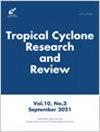Phase transitions between tropical, subtropical, and extratropical cyclones: A review from IWTC-10
IF 4.1
4区 地球科学
Q3 METEOROLOGY & ATMOSPHERIC SCIENCES
引用次数: 0
Abstract
This review, which was adapted from a Tenth International Workshop on Tropical Cyclones (IWTC-10) report, discusses research findings and operational practices relevant to cyclone types and phase transitions (extratropical, subtropical, and tropical). The cyclone phase space (CPS) method is widely used in both historical investigations and real-time evaluation of cyclone type and transition; however, CPS parameter values depend on input data resolution, and universal thresholds do not currently exist to delineate when a cyclone transitions from one type to another. Assessments of phase transitions in a changing climate highlight potential latitude shifts in extratropical transition and increased potential for tropical transition, but realistic projections of future trends likely require high-resolution simulations that can capture the cyclone warm core.
Operational meteorological centers apply varied approaches to cyclone classification via CPS parameters and other criteria, some of which depend on the tropical basin, yet these approaches cannot fully address challenges in operational classification and subsequently in communicating risks associated with these phase transitions. We recommend a multivariate historical assessment of tropical and subtropical cyclones across all basins in which they occur, including the South Atlantic Ocean and the Mediterranean Sea, to identify the potential for a more universal cyclone classification approach that meets operational needs.
热带、亚热带和温带气旋之间的相变:来自IWTC-10的回顾
这篇综述改编自第十届国际热带气旋研讨会(IWTC-10)的报告,讨论了与气旋类型和相变(温带、亚热带和热带)有关的研究成果和业务实践。旋风相空间(CPS)方法在旋风类型和转变的历史调查和实时评价中得到了广泛应用;然而,CPS参数值取决于输入数据的分辨率,目前还不存在通用阈值来描述气旋何时从一种类型转变为另一种类型。对气候变化中的相变的评估强调了温带转变的潜在纬度变化和热带转变的增加可能性,但对未来趋势的现实预测可能需要高分辨率模拟,以捕捉气旋暖核。业务气象中心通过CPS参数和其他标准应用各种方法对气旋进行分类,其中一些取决于热带盆地,但这些方法不能完全解决业务分类以及随后与这些相变相关的风险沟通方面的挑战。我们建议对热带和亚热带气旋发生的所有盆地(包括南大西洋和地中海)进行多变量历史评估,以确定满足业务需求的更通用的气旋分类方法的潜力。
本文章由计算机程序翻译,如有差异,请以英文原文为准。
求助全文
约1分钟内获得全文
求助全文
来源期刊

Tropical Cyclone Research and Review
METEOROLOGY & ATMOSPHERIC SCIENCES-
CiteScore
4.60
自引率
3.40%
发文量
184
审稿时长
30 weeks
期刊介绍:
Tropical Cyclone Research and Review is an international journal focusing on tropical cyclone monitoring, forecasting, and research as well as associated hydrological effects and disaster risk reduction. This journal is edited and published by the ESCAP/WMO Typhoon Committee (TC) and the Shanghai Typhoon Institute of the China Meteorology Administration (STI/CMA). Contributions from all tropical cyclone basins are welcome.
Scope of the journal includes:
• Reviews of tropical cyclones exhibiting unusual characteristics or behavior or resulting in disastrous impacts on Typhoon Committee Members and other regional WMO bodies
• Advances in applied and basic tropical cyclone research or technology to improve tropical cyclone forecasts and warnings
• Basic theoretical studies of tropical cyclones
• Event reports, compelling images, and topic review reports of tropical cyclones
• Impacts, risk assessments, and risk management techniques related to tropical cyclones
 求助内容:
求助内容: 应助结果提醒方式:
应助结果提醒方式:


